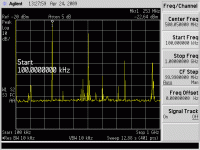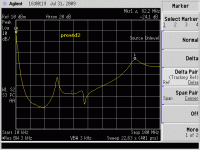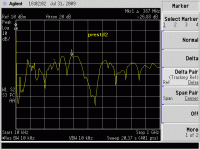Plain thick curtains on all the walls of my living room are all that is needed to take care of the reverberation. With them, the acoustics is quite good.
You probably didn't read Enid's article about wetting them all down for even better effect.
Plain thick curtains on all the walls of my living room are all that is needed to take care of the reverberation. With them, the acoustics is quite good.
Wow!!
You probably didn't read Enid's article about wetting them all down for even better effect.
Did she compare the effects of DI water to RO?
I don't think that characterizes the postmodernist at all. The postmodernist
is the guy who understands that many of our theories will fall short when
confronted by human behavior.
😎
Yes. I think they actually meant post-factual.
Did she compare the effects of DI water to RO?
I would add Schauberger vortex energized water to the mix. They had one at Bonny Doon, missed Coturri on this trip. I must be doing something right both my wife and daughter found Turley Zin undrinkable even faced with the syncophants.
Plain thick curtains on all the walls of my living room are all that is needed to take care of the reverberation. With them, the acoustics is quite good.
Yes, for high frequencies. I had to put memory foam mattresses behind curtains, and even bass traps inside of one wall. But I have to admit, wet blankets is a darn good idea! I once had wet coating of speaker cones, it sounded superb, before dried...
Dick I must have missed something, I don't find bi-directional power conditioning/filtering future or rocket science. Why on earth was the Tice clock brought up in the first place? I took it as an implication that an ordinary black box connected to any outlet via 6' of ordinary zip cord to boot could clean up all the wiring in your house. That I don't buy.
There is a lot of distortion on this forum so here is what you missed - connecting the dots:
dot #
1. A person listens and takes notes for an equipment review -- the notes are dated and time of listening recorded. Eventually the listening notes/data shows a correlation with the time which the listening took place.
2. Measurements and tests show ac line noise is higher during the day time and lower later in the evening. end
2. A clock when plugged in changed the sound heard. Z tests show a weak resonance filter action across the ac line in the midrange with most small appliances in the home. end.
3. A new better filter is made and the differences heard between day time and late evening are gone. end
4. D.self tests show audio thd increases with rfi on the ac line. your preamp/amp maybe better or worse. end
Connect these dots. is noise/rfi on the ac power lines audible? can it be 'proved'?
Thats all.
you draw your own conclusions when you connect the dots I've put out to look at.
Thx,
Richard
Last edited:
In commenting - anyone -- spare me (us) the long version and tangents ... about delusional and blacebo affects and wanted it to be better, so it was etal. We know that version of what is reality.... how do we know what we know. how do we know what we dont know.
Last edited:
Yes, for high frequencies. I had to put memory foam mattresses behind curtains, and even bass traps inside of one wall. But I have to admit, wet blankets is a darn good idea! I once had wet coating of speaker cones, it sounded superb, before dried...
I didn't measure. When I moved to my present house, the reverberation was very high and the sound system sounded awful, unbearable. I installed the drapes and the sound system sounded most enjoyable. Later on I invited an acoustics consultant who took measurements and recommended some minor additions of certain absorbers.
Meanwhile there was a fire in my house and most of my living furniture was thrown away. I hope to get new (second hand) furniture and install drapes again next month. When all will be set, I'll invite again the acoustics consultant.
I don't know about wet blankets and I'm not going to use any. The drapes plus the recommended additional absorbers is all that is needed for perfect acoustics in my living room. I live in a village, so there is virtually no outside noise in the evenings, when I listen to music.
.... how do we know what we know. how do we know what we dont know.
That's a major philosophical and existential issue.
That's for each to find out on one's own.
There is a lot of distortion on this forum so here is what you missed - connecting the dots:
dot #
1. A person listens and takes notes for an equipment review -- the notes are dated and time of listening recorded. Eventually the listening notes/data shows a correlation with the time which the listening took place.
2. Measurements and tests show ac line noise is higher during the day time and lower later in the evening. end
2. A clock when plugged in changed the sound heard. Z tests show a weak resonance filter action across the ac line in the midrange with most small appliances in the home. end.
3. A new better filter is made and the differences heard between day time and late evening are gone. end
4. D.self tests show audio thd increases with rfi on the ac line. your preamp/amp maybe better or worse. end
Connect these dots. is noise/rfi on the ac power lines audible? can it be 'proved'?
Thats all.
you draw your own conclusions when you connect the dots I've put out to look at.
Thx,
Richard
Midrange of what? I don't consider rfi to refer to frequencies in the audio range and I repeat high quality line conditioning for sensitive equipment is well known maybe that's why this discussion baffled me. Line noise causing audible artifacts is well known (for a long time) this has been dealt with in other industries for years.
In 3) above is this plugged into the same circuit? If so why not a power conditioner/filter that removes all signals going either way except the mains frequency.
Better make sure it's not the other phase of the mains, for US customers 😀. Electricians like to balance the load.
EDIT - I'm sorry I did not have time to read the patents that SY posted, if they claim powerline conditioning as prior art and they are an improvement I would gladly read them before making anymore comments.
Last edited:
STILL miss the point ! Its the process.
Dear Baffled:
Geeez, you STILL miss the point of the example. It is not about filters per se~
That was thrown in because JC asked about a specific early filter design (not current filters). Maybe that is where the story took a turn for you.
It has been about a process that starts with listening first.
Signed: Oh, never mind.

Midrange of what? I don't consider rfi to refer to frequencies in the audio range and I repeat high quality line conditioning for sensitive equipment is well known maybe that's why this discussion baffled me. Line noise causing audible artifacts is well known (for a long time) this has been dealt with in other industries for years.
In 3) above is this plugged into the same circuit? If so why not a power conditioner/filter that removes all signals going either way except the mains frequency.
Better make sure it's not the other phase of the mains, for US customers 😀. Electricians like to balance the load.
EDIT - I'm sorry I did not have time to read the patents that SY posted, if they claim powerline conditioning as prior art and they are an improvement I would gladly read them before making anymore comments.
Dear Baffled:
Geeez, you STILL miss the point of the example. It is not about filters per se~
That was thrown in because JC asked about a specific early filter design (not current filters). Maybe that is where the story took a turn for you.
It has been about a process that starts with listening first.
Signed: Oh, never mind.

Last edited:
where "conventional engineering" could easily have jumped ahead
"audio engineers" must be remarkably stupid not to know the basics of how bench instrumentation is built or what any of it was built to measure, never to look anywhere else in other EE diciplines for clues how to buid good quality circuits, never to look to see why any of the many component types were developed to meet other EE circuit requirements
good thing they have these visonaries taking notes of their listening experiences
"audio engineers" must be remarkably stupid not to know the basics of how bench instrumentation is built or what any of it was built to measure, never to look anywhere else in other EE diciplines for clues how to buid good quality circuits, never to look to see why any of the many component types were developed to meet other EE circuit requirements
good thing they have these visonaries taking notes of their listening experiences
Last edited:
That's one way to look at it. Where's the love? We're all in this together.
You know test equipment cost a lot of money to own or rent. Maybe it wasnt that they are the stupidist people on this or any other planet. Could be they just didnt have the means or access to the test equipment.
What audio engineer/designer has an HP 4194 to use for Z measurments? Precision LCR bridges to 100Khz. Who has HP and Anritsu network analyzers and wideband CT probes which cover from 10hz to 6Ghz? Or Tek TDR plugin's. Spectrum analyzers into GHz range. Or TEK 576 with plugins. Ditto 500MHz scopes and plugins. Etc. Maybe an audio engineer would have an THD/IM meter and a TEK 576. Plus a free/cheap sim software. OR maybe now a better sim program. I personally own all those test and measurement instruments and alot more. So, I know it aint cheap to find out whats going on.
You know test equipment cost a lot of money to own or rent. Maybe it wasnt that they are the stupidist people on this or any other planet. Could be they just didnt have the means or access to the test equipment.
What audio engineer/designer has an HP 4194 to use for Z measurments? Precision LCR bridges to 100Khz. Who has HP and Anritsu network analyzers and wideband CT probes which cover from 10hz to 6Ghz? Or Tek TDR plugin's. Spectrum analyzers into GHz range. Or TEK 576 with plugins. Ditto 500MHz scopes and plugins. Etc. Maybe an audio engineer would have an THD/IM meter and a TEK 576. Plus a free/cheap sim software. OR maybe now a better sim program. I personally own all those test and measurement instruments and alot more. So, I know it aint cheap to find out whats going on.
Last edited:
Dear Baffled:
It has been about a process that starts with listening first.

Enjoying a 1959 recording through an SET amp and single driver speakers starts with the same process.
For me I am presented with an instrumentation problem that at some level is very sensitive to interferors, I start with measurements the listening process is frought with problems. How about listening in darkness vs sunlight, any effort to eliminate this from the data?
EDIT - One does not need that litany of expensive equipment to measure what is going on, you underestimate the resourcefullness of many engineers. Fundamentally we disagree, I don't trust the repeatability or calibration of the "listening experience" from one day or place/system to the next.
Last edited:
Oh BTW, as for listening first Mr. Tice backed out of any test where there was no peeking citing any number of the usual excuses. I guess he can't trust his own ears either.
I often agree -
Actually, I agree more than you know. I am not under estimating anyone -- I used to be more resourceful.... a lot can be done with a function generator, scope and voltmeters. A little more with a THD meter. And, more still with ----- .
Fundementally, I do the same thing -- I start with measure, test etc. But, I sometimes use those who cant do it that way to get clues as to what and where to measure. That's not a big disagreement. Its a little one.
Obviously, I have all this other gear for other reasons besides my audio hobby. Like to measure the affect of different configurations with gas discharge tube across an F-connector on a 2Ghz signal to be used on a product.
Enjoy the music. That's what is most important with me.
-RNM
Enjoying a 1959 recording through an SET amp and single driver speakers starts with the same process.
For me I am presented with an instrumentation problem that at some level is very sensitive to interferors, I start with measurements the listening process is frought with problems. How about listening in darkness vs sunlight, any effort to eliminate this from the data?
EDIT - One does not need that litany of expensive equipment to measure what is going on, you underestimate the resourcefullness of many engineers. Fundamentally we disagree, I don't trust the repeatability or calibration of the "listening experience" from one day or place/system to the next.
Actually, I agree more than you know. I am not under estimating anyone -- I used to be more resourceful.... a lot can be done with a function generator, scope and voltmeters. A little more with a THD meter. And, more still with ----- .
Fundementally, I do the same thing -- I start with measure, test etc. But, I sometimes use those who cant do it that way to get clues as to what and where to measure. That's not a big disagreement. Its a little one.
Obviously, I have all this other gear for other reasons besides my audio hobby. Like to measure the affect of different configurations with gas discharge tube across an F-connector on a 2Ghz signal to be used on a product.
Enjoy the music. That's what is most important with me.
-RNM
Last edited:
Oh BTW, as for listening first Mr. Tice backed out of any test where there was no peeking citing any number of the usual excuses. I guess he can't trust his own ears either.
BTW - I never met Mr Tice and never heard him say anything about his or any product. I think his reported spin was all BS. he had no idea why it made a difference to people... as reported in mags.
But I understand your mistrust of people hearing things and itsnot being a reliable indicator of anything. No trust. Me? I always trust first. Maybe because I havent been around audiophiles much. Ever.
-RNM
- Status
- Not open for further replies.
- Home
- Member Areas
- The Lounge
- John Curl's Blowtorch preamplifier part II


